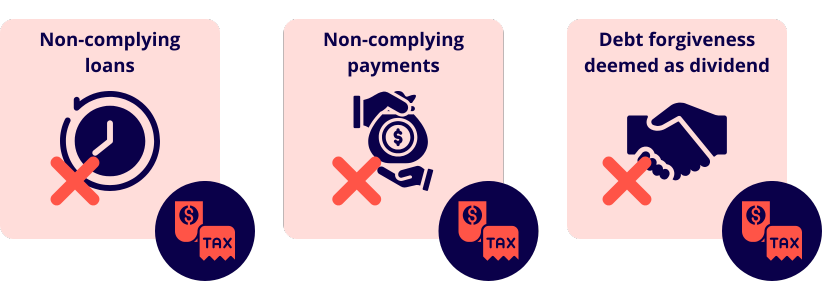Division 7A is a provision under the Income Tax Assessment Act that prevents private companies in Australia from distributing profits to shareholders (or their associates) without paying tax. Because of Division 7A, you cannot use your company bank account as your own bank account.
It might sound confusing at first, but it’s essential to understand how Division 7A affects how you run your small business. So let’s cover the basics and how small businesses can avoid falling foul of this legislation.
What is Division 7A?
Division 7A prevents private companies from distributing untaxed profits to shareholders or associates through non-complying loans, payments, or debt forgiveness instead of dividends or other forms of remuneration.
Instead of being treated as tax-free distributions, these arrangements could be considered deemed dividends and taxed accordingly.
As you might have already guessed, this piece of legislation was introduced to stop companies from disguising profit distributions as non-taxable benefits, which would otherwise result in tax-free income for the recipients.
For example, if a private company makes a loan to a shareholder or their associate without following the specific guidelines within the Division 7A rules, the loan will be deemed as a dividend and included in the shareholder’s assessable income.
Division 7A’s rules are broad-ranging: this ensures that any such loans or payments are taxed at the individual’s marginal tax rate.
When does Division 7A apply?

Whenever a private company gives financial benefits to shareholders or their associates, and there is no compliant Division 7A loan in place, Division 7A applies. This includes things like:
- Loans: If your company gives a loan to a shareholder or associate without a complying loan agreement, it may be deemed a dividend.
- Payments: Any payments your company makes that are not considered wages or services can also be treated as deemed dividends.
- Debt forgiveness: If your company forgives a debt owed by a shareholder or associate, under Division 7A it can be classified as a dividend.
In these cases, the ATO will treat the distribution as if your company paid a dividend, thereby subjecting it to income tax under Division 7A rules.
How Division 7A works
Under Division 7A, if a private company distributes profits to a shareholder or their associate in any way other than as a legitimate dividend or remuneration (e.g. a loan or payment), it will be treated as a deemed dividend. For tax purposes, the Australian Tax Office (ATO) will consider the benefit a dividend, which means the ATO will tax the individual who earned it. Worse still, this dividend cannot be franked.
A complying loan agreement is the only way to avoid distributed profits becoming deemed dividends. If the business makes a loan and meets certain criteria — such as a prescribed interest rate (known as the benchmark interest rate) and a set loan term — the loan will not be classified as a dividend.
Be aware that these agreements will still need to meet the ATO’s requirements, including minimum interest rates and terms for the loan to be fully repaid within seven years. Other requirements may apply, so make sure you do your research or speak to your accountant or financial advisor about how to manage your specific situation.
What does Division 7A cover?
Division 7A covers any arrangements that attempt to distribute a company’s profits without triggering tax obligations. This might involve, but is not limited to:
- If a loan is not repaid or structured according to a complying loan agreement.
- Non-wage payments to shareholders or their associates that give them a financial benefit.
- If the company forgives a shareholder’s debt.
The main purpose of Division 7A is to prevent companies from making tax-free distributions to their shareholders and associates.
What doesn’t Division 7A cover?
While Division 7A is broad, it doesn’t apply to every transaction. Here are a few situations where Division 7A won’t apply:
- Payments of dividends under formal dividend declaration.
- Commercial transactions where loans are at arm’s length and meet ATO requirements.
- Genuine business transactions involving third parties that are not shareholders or associates.
- Certain fringe benefits, already subject to Fringe Benefits Tax (FBT).
- Remuneration of associates.
- Loans that are fully repaid by the company’s lodgment day.
Who needs to be concerned about Division 7A?
Division 7A applies to any private company with shareholders or associates who receive loans or payments that could be treated as tax-free benefits. Small business owners and individual shareholders of private companies should be especially aware of Division 7A, as inadvertent transactions could result in tax issues you’re not expecting.
Private company benefits, such as financial assistance to shareholders, can be a potential liability for your small business, so you need to ensure that you always comply with Division 7A provisions. The easiest way to do this is by documenting all loans and payments through complying loan agreements.
Remember that businesses involved in trust estates and with unpaid present entitlements (UPE) might also be subject to Division 7A rules if UPEs are distributed to shareholders without triggering a dividend.
How do complying loan agreements work?
For a loan to be exempt from Division 7A rules, it must meet the following conditions:
- Loan term: Loans must be for a maximum of seven years for unsecured loans or 25 years if 100% secured by real property.
- Minimum interest rate: The loan must use the ATO’s benchmark interest rate, which is adjusted every year. The benchmark rate must be applied consistently over the loan term.
- Loan repayments: The loan should have a set repayment schedule, and the balance must be paid off within the agreed timeframe. Failure to comply with this could mean the loan is deemed a dividend.
How to avoid Division 7A issues
The most important tip is to understand and comply with the Division 7A provision.
Here are the most effective ways to avoid Division 7A issues:
- Don’t pay private expenses from a company bank account.
- Keep accurate records that explain all transactions – during an audit if expenses cannot be substantiated these could be deemed private, leaving a loan payable by the associate.
- Keep on time with your tax lodgment obligations – this way you can discover issues in a timely manner and allow you to take corrective action.
- If you decide to lend company money to an associate, do this only with a complying Division 7A loan. Seek advice in this instance.
- Repay any loans remaining at the end of a financial year by lodgment date.
- Declare a dividend before the end of the financial year so that any balance owed is extinguished.
While it can get complex when you dig into the specifics, understanding Division 7A is something all small businesses and private companies in Australia should be conscious of. Using the services of a knowledgeable bookkeeper and/or accountant will help you minimise the risk of exposure to the Division 7A provisions. Stay on top of your legal responsibilities so you can avoid unintended tax problems from the ATO and be compliant with the Income Tax Assessment Act.























